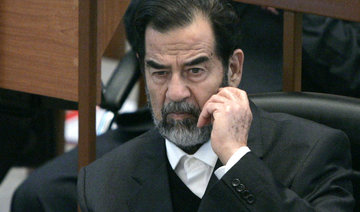BAGHDAD: Karrar Hassan, 25, is just one of tens of thousands of Iraqi fighters wounded battling the Daesh group. Now disabled, he struggles to survive on a $400 pension.
In 2014, he was unemployed and joined the Hashed Al-Shaabi, a paramilitary coalition dominated by Iran-backed groups that fought alongside Iraqi government forces against the jihadists.
Months later, during fierce fighting for the city of Fallujah west of Baghdad, his left calf was ripped open by a blast and Karrar lost the leg.
The Hashed sent him for treatment to both Iran and Lebanon, and he returned with a prosthesis from the knee down.
This gave him enough mobility to allow a return to the front.
In 2015, Karrar was fighting in Baiji city, north of the capital, when he was hit again.
This time two bullets shattered his right knee, putting him out of action once and for all.
Iraq declared victory over Daesh in December 2017, after a gruelling three-year onslaught that also wounded tens of thousands of fighters.
The Hashed says it lost 8,000 men in the war on Daesh, and 26,000 were wounded.
Iraq’s government, which mobilized tens of thousands of members of the security forces for the campaign, has not given its own toll.
Karrar, a father of three small children, has been left incapacitated.
Unemployed and now unable to drive, he spends his days at home trying to figure out how to provide for his family on a monthly pension of 500,000 Iraqi dinars ($400).
This amount represents a bit less than a medium salary in Iraq, but for Karrar it is not enough to buy medicine for his injuries as well as food for his wife and three children.
He says the ointment he needs to rub on his skin to avoid chafing from the prosthesis “costs $800” and lasts for 10 months.
Karrar would like to work, “but with my legs I can’t even drive a taxi” or carry anything heavy.
Abu Mehdi Al-Mohandis, second-in-command in the Hashed, says hospitals run by the paramilitary unit provide free medical care for 60,000 fighters and 300,000 civilians.
Dhia Hussein runs Al-Razi hospital for the Hashed in Baghdad, where he says 1,450 amputees have received treatment over the past six months alone.
Iraq has a long history of bloody conflict, from the 1980-1988 war with its neighbor Iran to the 2003 US-led invasion that toppled dictator Saddam Hussein and to the later struggle against Daesh.
Each conflict has resulted in a heavy toll of casualties, many of whom are amputees.
Tahssin Ibrahim has been making prosthetic limbs in Baghdad for more than 30 years.
He says the number of amputees has risen since the 2003 conflict, and the number of workshops specializing in prostheses and shops selling medical equipment has increased tenfold over the past 15 years.
Most of Ibrahim’s clients are war wounded, and he says many are forced to borrow money to pay for their artificial limbs.
The most rudimentary prosthesis costs around $1,000 in Iraq — more than twice the average monthly wage.
Ahmed, 32, was deployed with the federal police to second city Mosul, one of the jihadists’ main hubs before they were driven out by a fierce offensive that lasted for months.
An Daesh mortar blast tore through his right leg, and Ahmed says his pension of 575,000 Iraqi dinars is simply inadequate.
Every month, half of this goes toward “paying for medical treatment,” including doctor’s visits and medicine, leaving him with just half to buy food for the family. That “is not enough.”
A doctor’s visit also means a taxi fare, he said.
“The bus is not adapted for handicapped people so I have to take a taxi,” said the father of four.
One doctor who spoke to AFP, Ghassan Al-Alussi, believes that the pensions allocated to war veterans are “insufficient.”
“Public and health institutions must do more for amputee fighters because they have defended the country,” Alussi said.





























